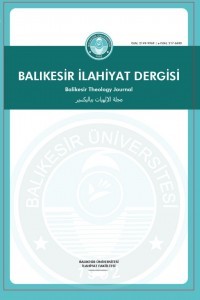Kur'an Perspektifinde Kıblenin Birliğine İlişkin Analizler
Bu araştırmada, tevhide davet eden peygamberlerin kıblesine ilişkin analizlerin tespiti amaçlanmıştır. Yön/cihet anlamına gelen kıble, kılınan namazın istikâmetini belirten bir kavram olarak tanımlanmaktadır. Namaz ibadetine kıble olan iki mabet vardır. Bunlardan biri Mescid-i Haram; diğeri Mescid-i Aksâ’dır. Âl-i İmrân 3/96. ayette Kâbe’nin ibadet için kurulan ilk mabet olduğundan bahsedilir. Buhârî’de/Müslim’de nakledilen hadiste ise ilk önce Kâbe; ondan kırk yıl sonra da Mescid-i Aksâ inşa edilmiştir. Bu minvalde her iki mabet Hz. Âdem’den (a.s.) beri İslâm’ın mabedidir. Mescid-i Haram; Müslümanların namaz ibadetinin kıblesi, hac/umre ibadetinin mekânıdır. Mescid-i Aksâ ise peygamberler içerisinde sadece Hz. Muhammed’in (s.a.s.) muvakkaten (16-17 ay) namazlarında yöneldiği ibadet mekânıdır. Hz. Muhammed (s.a.s.) öncesi nebilerin kıble olarak Mescid-i Aksâ’ya yöneldiklerine ilişkin Kitâb-ı Mukaddes’te/Kur’ân’da sarih bir bilgi verilmemiş; el-Bakara 2/144. ayette sadece Kâbe’nin kıble olduğu sarih bir şekilde beyan edilmiştir. Kitâb-ı Mukaddes, Hz. Süleymân inşa ettikten sonra özellikle Babil sürgününün akabinde Yahudilerin ibadetlerinde Mescid-i Aksâ’ya yöneldiklerini haber vermiştir. Peygamberimizin muvakkaten namazlarını Mescid-i Aksâ istikâmetinde kılması, elimizde kesin bir veri olmamakla birlikte önceki peygamberlerin de maslahata binaen namazlarında Mescid-i Aksâ’ya yönelme ihtimaline işaret etmektedir. Ayrıca kıble birliğinin dinin fürûundan olmadığına; aslından kabul edildiğine işaret edilerek peygamberlerin birbirlerinin kıblesini neshetmediği ifade edilmiştir. Hülâsa tüm peygamberlerin sabit/asıl/daimi kıblesinin Kâbe; Mescid-i Aksâ’nın ise sadece muvakkat kıble olduğu kanaati hâsıl olmuştur.
Analyzes Concerning The Unity of The Qibla in The Perspective of The Qur’an
In this research, it is aimed to determine the analyzes regarding the qibla of the prophets who invited to tawhid. Qibla, which means direction/direction, is defined as a concept that shows the direction of prayer performed. There are two temple that are qibla for prayer worship. One of them is Masjid-i Haram; the other is Masjid al-Aqsa. In the verse of Âl-i Imrân 3/96, it is mentioned that the Kaaba is the first temple established for worship. In the hadith reported in Bukhari/Muslim, first of all, the Kaaba; Forty years after that, the Masjid-i Aqsa was built. In this respect, both temples have been the temple of Islam since Adam. Masjid al-Haram; The qibla of Muslims praying is the place of pilgrimage/umrah. Masjid al-Aqsa is the place of worship to which Muhammad temporarily returns (16-17 months) during her prayers. There is no clear information in the Bible/the Quran that the prophets before Muhammad turned to Masjid al-Aqsa as a qibla; in the verse of al-Baqara 2/144, It is clearly stated that only the Kaaba is qibla. The Bible reports that after Solomon's construction, especially after the Babylonian exile, the Jews turned to Masjid al-Aqsa for their worship. The fact that the Prophet temporarily prayed in the direction of the Masjid al-Aqsa indicates the possibility of returning to Masjid al-Aqsa in prayers in order to get the benefit of the previous prophets and to repel damage. In addition, the unity of qibla is not from the details of religion. It has been stated that the prophets did not cancel each other's qibla, since the unity of qibla is accepted as the original religion. In summary, it is stated that the fixed/main/permanent qibla of all prophets is the Kaaba; It was concluded that Masjid al-Aqsa was just a temporary qibla.
___
- Âlûsî, Ebü’s-Senâ Şehâbeddîn Mahmûd b. Abdillâh b. Mahmûd el-Hüseynî. Rûhu’l-me‘ânî. thk. Ali Abdülbârî Atıyye. 16 cilt. Beyrut: Dâru’l-Kütübi’l-‘İlmiyye, 1415/1995.
Zeccâc, Ebû İshâk. Me‘âni’l-Kur’ân ve i’râbuhû. thk. Abdulcelîl Abduh Şelebî. 5 cilt. Beyrut: ‘Âlemü’l-Kütüb, 1408/1998.
Zemahşerî, Ebü’l-Kâsım Mahmûd b. Ömer b. Muhammed. el-Keşşâf ‘an hakâiki ğavâmizi’t-tenzîl ve ‘uyûni’l-ekâvîl fî vücûhi’t-te’vîl. 4 cilt. Beyrut: Dâru’l-Fikri’l-‘Arabî, 1407/1987.
